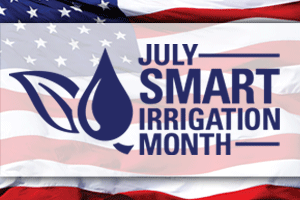[cs_element_gap _id=”4″ ][cs_element_headline _id=”8″ ][cs_element_section _id=”9″ ][cs_element_layout_row _id=”10″ ][cs_element_layout_column _id=”11″ ][x_custom_headline level=”h2″ looks_like=”h4″ accent=”false”]Water Smart in Omaha & Save Money This Summer

Most homeowners over-water their yard, unintentionally wasting money every time they take out the hose or turn on the sprinklers. To raise awareness of the benefits of efficient watering practices, the Irrigation Association has named July Smart Irrigation Month.
Using an automated sprinkler system is one of the best ways to keep your lawn and landscape beautiful and healthy, while minimizing water waste. Make time this summer to be sure you’re getting the most out of your sprinkler system (Omaha), while keeping utility bills low and helping to protect the environment.
[cs_element_layout_row _id=”14″ ][cs_element_layout_column _id=”15″ ][cs_element_gap _id=”16″ ][x_custom_headline level=”h2″ looks_like=”h4″ accent=”false”]Smart Start
Creating an efficient irrigation system requires specialized knowledge and understanding of sprinkler system design principles and local environmental conditions — something most weekend gardeners don’t have. Complying with local installation codes is another consideration.
Even the best sprinkler system design won’t perform well if installed incorrectly or using inferior components. Something as simple as selecting the correct type of pipe can mean the difference between a sprinkler system (Omaha) that lasts and one that requires ongoing repairs.
Hiring a certified or licensed irrigation professional and insisting on high-quality components is the smart way to make sure your system will operate at peak efficiency for years to come. Always get multiple bids, check references and confirm your preferred vendor is properly insured.
[x_custom_headline level=”h2″ looks_like=”h4″ accent=”false”]Lawn Sprinklers Omaha: Smart Planning & Planting Guarantee Long-Term Satisfaction
- Work with a certified irrigation designer or contractor who has experience in your local area.
- Consider local climate conditions, as well as your lot’s exact features. Choose appropriate turf and plant species that have low water requirements.
- Group plants with similar water needs close together and separate grassy areas from plants.
- Plan your irrigation zones carefully. Be sure that your system will have enough capacity, now and in the future. The more irrigation zones you plan, the more you can tailor watering even if you modify landscaping.
- Consult with your local water provider to see if rebates are available for water-efficient products.
• Check the on-site water pressure and select appropriate sprinklers. Low or high water pressure can seriously affect sprinkler performance. - Include “smart” controls that automatically adjust watering based on rain, soil moisture, evaporation and plant water use.
- Use the best components you can afford to minimize future maintenance and total lifetime cost of your system.
Use sprinkler system components that provide the greatest flexibility. Different plants have different watering needs, and these needs may change over time. Your lawn sprinklers (Omaha) should allow you to apply the right amount of water for each type of plant by the most effective method.
- Always install excess irrigation zone capacity. Irrigation zones are areas that are watered by the same irrigation valve and plumbing. Installing extra connections now makes it easier and less expensive to expand your irrigation system later.
- Include the right backflow prevention device for your area. Required by the National Plumbing Code for all irrigation systems, backflow prevention devices prevent irrigation system water from contaminating the water supply.
- Install lines deep enough to protect them from damage from aeration and other lawn maintenance.
[x_custom_headline level=”h2″ looks_like=”h4″ accent=”false”]Smart Sprinkler System Scheduling & Watering
Today’s irrigation controllers allow you to easily adjust your system’s watering schedule to fit different watering needs.
- Schedule each individual zone in your irrigation system to account for sun, shade and wind exposure.
- Consider soil type, which affects the how quickly water can be applied and absorbed without runoff.
- Make sure you’re not sending water down the drain. Set sprinklers to water plants, not your driveway, sidewalk, patio or buildings.
- Water at the right time of day. Watering when the sun is low, winds are calm and temperatures are cooler minimizes evaporation by as much as 30 percent. The best times to water are late afternoon, evening and just before sunrise.
- Saturate the root zones (generally within the top six inches of soil), then let the soil dry. Watering too frequently results in shallow roots and encourages weed growth, disease and fungus.
- Reduce runoff by watering each zone more often for shorter periods. For example, setting your system to run for three, 5-minute intervals lets soil absorb more water than watering for 15 minutes at one time.
- Adjust your watering schedule regularly to account for seasonal weather conditions, plant size and other factors. Monthly (or even weekly) adjustments keep plants healthy without overwatering.
[x_custom_headline level=”h2″ looks_like=”h4″ accent=”false”]Smart Sprinkler System Maintenance & Upgrades
Sprinkler systems (Omaha) need regular maintenance to keep them working efficiently year after year. Damage from lawn equipment or improper winterization can cause leaks and other serious problems.
- Inspect the system for leaks, broken or clogged sprinkler heads or other damaged components.
- Check that sprinkler heads are high enough to clear plants that may have grown taller since the system was installed.
- Adjust spray patterns and positions to make sure they aren’t watering “hardscapes” like sidewalks and buildings.
- Evaluate pressure and adjust as needed to work optimally with your system.
- Retrofit the system with a rain or soil moisture sensor to prevent overwatering. Rain sensors stop the system from operating when it rains; soil moisture sensors use long metal probes to measure moisture at the root zone and turn off the system when no additional water is needed.
- Before upgrading your system, check to see if your local water provider offers rebates on any products you are considering.
Smart Irrigation Month is an initiative of the Irrigation Association, a non-profit industry organization dedicated to promoting efficient irrigation.